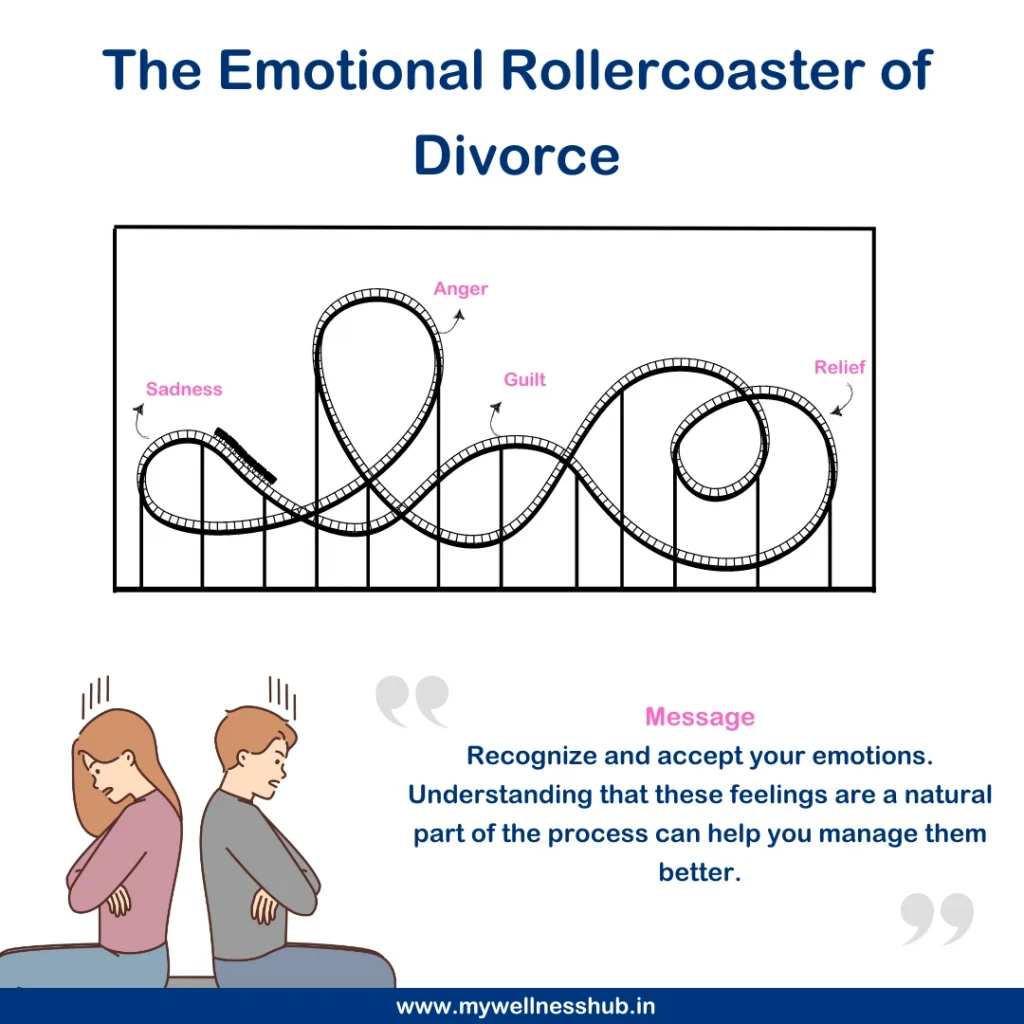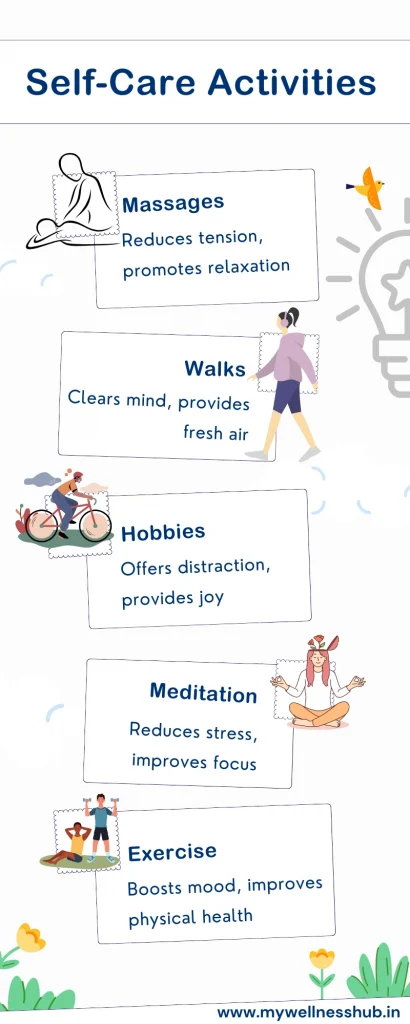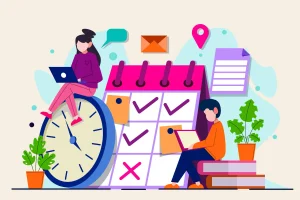How to Cope with Divorce: Insights from a Therapist
By Wellness Hub
Last Updated: August 5, 2024
Divorce is not just a legal process; it’s an emotional journey that can feel like navigating a tumultuous sea of feelings, from deep sorrow to unexpected relief. The aim of this guide is to equip you with therapist-approved strategies to effectively cope with divorce. Whether you’re at the onset or finding yourself stuck in the aftermath, our insights offer tailored support for managing the stress and emotional challenges of this life transition. Dive into our comprehensive guide as we explore various aspects of how to cope with divorce, including emotional healing and professional guidance, ensuring you’re not alone on this journey
Book Your Marriage Counselling Now
Understanding Your Feelings

Going through a divorce is like riding an emotional rollercoaster. One moment, you might feel sadness and grief over the loss of your relationship, and the next, you could be angry or even relieved. It’s crucial to acknowledge these feelings rather than suppress them. Recognizing and processing your emotions is a key step in your healing journey.
Divorce often brings a mix of conflicting emotions. You may experience a deep sense of loss, similar to grieving a death. There could be anger and resentment towards your ex-partner, or even guilt and self-blame. It’s important to remember that these feelings are natural and part of the process.
Take time to reflect on your emotions. Ask yourself, “What am I feeling right now?” and “Why do I feel this way?” Understanding the root of your emotions can help you manage them better. For example, if you’re feeling angry, it might be because you feel betrayed or unfairly treated. Acknowledging this can help you find healthier ways to cope, such as talking to a friend or writing in a journal.
Also read: Relationship Counselling or Couple’s therapy: Know everything
Practical Tips for Coping with Divorce
Don’t Be Hard on Yourself
When going through a divorce, it’s easy to fall into the trap of self-blame and guilt. However, it’s crucial to practice self-compassion during this challenging time. Remember, divorce is a complex process that involves two people. It’s not solely your fault, and blaming yourself will only hinder your healing.
Importance of Self-Compassion
Being kind to yourself is essential. Self-compassion means treating yourself with the same kindness and understanding that you would offer to a friend in a similar situation. It’s about recognizing that you are human and that everyone makes mistakes. This perspective can help you navigate the emotional turbulence that comes with divorce.
Instead of dwelling on what you could have done differently, focus on what you can do now to support yourself. This shift in mindset can significantly impact your emotional well-being and help you move forward.
Forgiving Yourself and Letting Go of Guilt
Forgiving yourself is a powerful step towards healing. Holding onto guilt and self-blame can prevent you from moving on and finding happiness again. Here are some steps to help you let go of guilt:
- Acknowledge Your Feelings: Recognize and accept your emotions without judgment. It’s okay to feel guilty, but it’s also important to understand that these feelings are part of the healing process.
- Reflect on the Bigger Picture: Understand that the end of a marriage is rarely the fault of one person. It involves a combination of factors and circumstances.
- Talk to a Therapist: A professional can help you work through your emotions and provide strategies to manage guilt. Therapy can offer a safe space to explore your feelings and develop healthier coping mechanisms.
- Practice Forgiveness: Actively work on forgiving yourself. This might involve writing a letter to yourself, acknowledging your feelings, and then letting them go. Remember, forgiveness is a journey, not a destination.
- Focus on the Future: Instead of dwelling on the past, concentrate on what you can do now to build a better future. Set new goals and take small steps towards achieving them.
Find a Support System
When dealing with divorce, it’s essential to build a strong support system. Leaning on friends, family, and support groups can provide the emotional stability you need during this difficult time.
Lean on Friends, Family, and Support Groups
Divorce can feel isolating, but it’s important to remember that you don’t have to go through it alone. Your friends and family are valuable sources of support. They know you well and can offer the comfort and understanding you need. Reach out to them, even if it’s just to talk or spend some time together. Having someone to share your feelings with can make a big difference.
In addition to friends and family, consider joining support groups. These groups consist of people who are going through similar experiences and can provide unique insights and empathy. Being around others who understand what you’re going through can help you feel less alone and more understood.
Benefits of Connecting with Others Who Understand
Connecting with others who understand your situation offers several benefits:
- Emotional Support: Sharing your feelings with someone who has been through a similar experience can be incredibly comforting. It helps to know that others have faced the same challenges and have come out stronger.
- Practical Advice: Support groups and friends can offer practical advice on how to handle various aspects of divorce, from legal matters to co-parenting. They can share what has worked for them, providing you with new strategies to cope.
- Reduced Isolation: Divorce can lead to feelings of loneliness and isolation. By building a support network, you can combat these feelings and create a sense of community.
- Improved Mental Health: Having a strong support system can significantly improve your mental health. It reduces stress, anxiety, and depression, making it easier for you to navigate the emotional challenges of divorce.
- Increased Resilience: Knowing that you have people to rely on can boost your resilience. It gives you the strength to face the difficulties of divorce and move forward with your life.
Also read: Is Online Marital Counselling Best Therapy? What are it uses
Make Time for Self-Care

Self-care is crucial when you’re going through a divorce. Taking time to nurture yourself can significantly impact your mental and physical well-being, helping you navigate this challenging period more effectively.
Various Self-Care Activities
Engaging in self-care activities can help alleviate the stress and emotional burden of divorce. Here are some ideas to get you started:
- Massages: Treat yourself to a relaxing massage. It can help reduce tension, improve circulation, and promote relaxation.
- Walks: Going for a walk, especially in nature, can be incredibly soothing. It allows you to clear your mind, get some fresh air, and benefit from physical exercise.
- Hobbies: Rediscover or develop new hobbies. Whether it’s painting, gardening, reading, or cooking, engaging in activities you enjoy can provide a much-needed distraction and a sense of accomplishment.
- Meditation and Yoga: These practices can help you center your thoughts, reduce stress, and improve your overall sense of well-being. They are great ways to maintain emotional balance.
- Exercise: Regular physical activity is vital for maintaining both mental and physical health. It releases endorphins, which can help improve your mood and reduce feelings of anxiety and depression.
- Pampering: Take time to pamper yourself. This could be as simple as taking a long bath, doing a skincare routine, or having a spa day at home.
Importance of Maintaining Mental and Physical Health
Maintaining your mental and physical health is essential during a divorce. Here’s why self-care is so important:
- Reduces Stress: Self-care activities can significantly reduce stress levels. Lower stress helps you think more clearly and make better decisions.
- Boosts Mood: Engaging in activities you enjoy can boost your mood and provide a sense of joy and fulfillment, even during tough times.
- Improves Physical Health: Physical activities like walking, yoga, and exercise keep your body healthy. Good physical health is closely linked to better mental health.
- Enhances Emotional Resilience: Taking care of yourself builds emotional resilience. It equips you with the strength to handle the ups and downs of divorce.
- Encourages Positive Outlook: Self-care encourages a positive outlook on life. It helps you focus on the present and future, rather than dwelling on the past.
Also read: Marriage Counseling: Signs It Can Save You
Look for Divorce Counseling
Divorce is a complex and emotionally charged process. Seeking professional help can make a significant difference in how you navigate this challenging time. Divorce counseling offers a safe space to explore your emotions, develop coping strategies, and move forward with your life.
How Professional Help Can Assist in Navigating Emotions
Therapists are trained to help you understand and manage your emotions during a divorce. They can provide guidance on how to deal with feelings of anger, sadness, guilt, and anxiety. Here’s how professional counseling can assist you:
- Emotional Support: A therapist provides a non-judgmental and supportive environment where you can express your feelings openly. They can help you process these emotions and gain clarity.
- Coping Strategies: Counselors can teach you effective coping mechanisms to manage stress and emotional turmoil. This might include mindfulness techniques, stress reduction strategies, and ways to build emotional resilience.
- Conflict Resolution: Therapy can help you develop skills to manage conflict with your ex-spouse. This is especially important if you have children and need to maintain a cooperative co-parenting relationship.
- Perspective and Insight: A professional can offer a fresh perspective on your situation, helping you understand patterns in your behavior and emotions. This insight can be invaluable for personal growth and moving forward.
- Goal Setting: Therapists can assist you in setting realistic and achievable goals for your future. This process can help you focus on rebuilding your life and finding new purpose.
Also read: Steps to Prepare for Marriage Counseling: A Simple Guide
Benefits of Therapy for You and Your Children
Divorce not only affects you but also has a profound impact on your children. Therapy can provide significant benefits for both you and your children:
- Improved Communication: Therapy can help improve communication skills, making it easier to talk about difficult topics with your children and ex-spouse.
- Emotional Stability: Counseling can provide your children with a safe space to express their feelings and fears about the divorce. This can help them feel more secure and understood.
- Behavioral Support: Therapists can work with children to address any behavioral issues that may arise due to the stress of divorce. This includes helping them develop healthy coping mechanisms.
- Strengthened Relationships: Family therapy can help strengthen the bonds between you and your children. It fosters a supportive family environment, even during challenging times.
- Long-term Well-being: Engaging in therapy during a divorce can set a foundation for long-term emotional health for both you and your children. It teaches valuable life skills that can be used to handle future challenges.
Discover New Interests & Hobbies
Finding new interests and hobbies can be a powerful way to cope with the emotional challenges of divorce. Engaging in new activities helps keep your mind occupied and can prevent you from dwelling on negative feelings.
Keeping Busy to Avoid Dwelling on Negative Feelings
During a divorce, it’s easy to get caught up in a cycle of negative thoughts and emotions. Keeping busy can help break this cycle. When you immerse yourself in activities that interest you, it shifts your focus away from the pain and towards something positive and productive.
Staying busy doesn’t mean you should avoid processing your emotions, but it can provide a healthy balance. Engaging in activities you enjoy can lift your spirits and provide a sense of normalcy during an otherwise tumultuous time.
Exploring New Activities and Interests
Exploring new hobbies and interests can be incredibly therapeutic. It provides an opportunity to discover passions you may not have had time for before. Here are some ideas to get you started:
- Creative Arts: Activities like painting, drawing, writing, or playing an instrument can be great outlets for expressing emotions. They allow you to channel your feelings into something creative and tangible.
- Physical Activities: Exercise is not only good for your physical health but also your mental well-being. Consider joining a local sports team, taking up yoga, or even just going for regular walks or runs.
- Learning Opportunities: Take this time to learn something new. This could be anything from a new language to a cooking class. Online courses are widely available and can be done at your own pace.
- Gardening: Spending time outdoors and nurturing plants can be very soothing. Gardening gives you a sense of accomplishment as you see your efforts grow and flourish.
- Volunteer Work: Helping others can provide a sense of purpose and fulfillment. Find local volunteer opportunities that resonate with you. It’s a great way to give back to the community while also helping yourself heal.
- Travel and Exploration: If possible, take some time to travel. Exploring new places can provide a fresh perspective and a break from your usual environment.
Avoid Conflict with Your Spouse or Former Spouse
Divorce can be a breeding ground for conflict, but minimizing these tensions is crucial for your emotional well-being. Reducing conflict not only makes the divorce process smoother but also helps in maintaining a healthier mental state.
Importance of Minimizing Conflict
Minimizing conflict during and after a divorce is vital for several reasons:
- Emotional Health: Constant arguments and disputes can take a toll on your mental health. Stress and anxiety can escalate, making it harder to cope with the overall process.
- Children’s Well-Being: If you have children, minimizing conflict is even more important. Children are deeply affected by parental strife, and reducing conflict can help them adjust better to the changes.
- Effective Communication: Lower conflict levels foster better communication. This is particularly important if you need to co-parent, as it helps create a more cooperative and supportive environment for your children.
- Faster Resolution: Avoiding conflicts can speed up the legal process. Less animosity can lead to quicker agreements, saving time, money, and emotional energy.
Techniques for Managing Interactions and Emotions
Managing interactions with your spouse or former spouse can be challenging, but these techniques can help:
- Set Boundaries: Clearly define and maintain boundaries to protect your emotional well-being. Decide on the best ways and times to communicate, and stick to those guidelines.
- Stay Calm: In heated moments, practice staying calm. Take deep breaths, count to ten, or step away from the situation if necessary. Responding with a calm demeanor can prevent escalation.
- Use Neutral Language: Avoid accusatory or inflammatory language. Stick to neutral, fact-based communication to keep interactions as peaceful as possible.
- Focus on the Issue at Hand: Try not to bring up past grievances or unrelated issues. Concentrate on resolving the current matter.
- Practice Active Listening: Show that you are listening by nodding and summarizing what your spouse is saying. This can help de-escalate tensions and demonstrate that you are trying to understand their perspective.
- Limit Interactions: If interactions often lead to conflict, limit them to essential communication only. Use written communication like emails or texts, which can be less emotionally charged than face-to-face or phone conversations.
- Seek Mediation: A professional mediator can help facilitate discussions and negotiations, ensuring they remain productive and less contentious.
- Self-Care: Engage in regular self-care to manage your stress levels. Activities such as exercise, hobbies, and spending time with supportive friends and family can help you stay balanced and calm.
- Professional Support: If conflict continues to be a significant issue, consider seeking help from a therapist or counselor. They can provide strategies for managing your emotions and improving interactions.
Think Positively
Divorce can cast a long shadow over your life, making it difficult to see beyond the immediate pain and disruption. However, cultivating a positive mindset can significantly impact your healing process and help you move forward with resilience and hope.
Power of Positive Thinking and Its Impact on Healing
Positive thinking doesn’t mean ignoring the reality of your situation. Instead, it involves focusing on the potential for growth and new opportunities. Here’s how positive thinking can aid in your healing:
- Boosts Emotional Health: Positive thinking helps reduce stress and anxiety. By focusing on the good things in your life, you can improve your overall mood and emotional well-being.
- Enhances Physical Health: A positive outlook can have tangible benefits for your physical health, including lower blood pressure, better immune function, and reduced risk of chronic diseases.
- Encourages Resilience: Positive thinking builds resilience, making it easier to bounce back from setbacks and handle future challenges with a proactive attitude.
- Improves Relationships: Maintaining a positive mindset can improve your interactions with others, fostering stronger and more supportive relationships.
To cultivate positive thinking, try these strategies:
- Practice Gratitude: Each day, write down three things you’re grateful for. This simple practice can shift your focus from what’s going wrong to what’s going right.
- Surround Yourself with Positivity: Spend time with people who uplift and support you. Avoid those who bring negativity into your life.
- Use Positive Affirmations: Repeat positive statements about yourself and your future. This can help reframe your mindset and reinforce a positive outlook.
- Focus on Solutions, Not Problems: When faced with a challenge, focus on finding solutions rather than dwelling on the problem.
Modeling Positive Behavior for Children
If you have children, your attitude and behavior during this time can significantly influence their adjustment and well-being. Modeling positive behavior is crucial for their emotional health:
- Set an Example: Children often imitate their parents’ behaviors and attitudes. By demonstrating positivity, you show them how to handle difficult situations with grace and optimism.
- Promote Open Communication: Encourage your children to express their feelings and concerns. Listen actively and respond with understanding and reassurance.
- Highlight Strengths and Achievements: Celebrate your children’s strengths and achievements, no matter how small. This reinforces their self-esteem and helps them feel valued.
- Teach Problem-Solving Skills: Show your children how to approach challenges with a solution-oriented mindset. Involve them in age-appropriate problem-solving activities.
- Maintain Routine and Stability: A consistent routine provides a sense of security and normalcy. Even small daily rituals can help your children feel more stable during times of change.
- Be Patient and Compassionate: Understand that children may struggle with their emotions and behaviors. Approach them with patience and compassion, offering support as they navigate their feelings.
Self-Reflect
Self-reflection is a powerful tool for healing and personal growth during and after a divorce. By analyzing the past, you can gain valuable insights that help you move forward with a clearer perspective and a stronger sense of self.
Analyzing the Past to Learn and Grow
Reflecting on your past relationship can be enlightening and therapeutic. It allows you to understand what worked, what didn’t, and why things happened the way they did. Here are some steps to help you analyze the past constructively:
- Identify Patterns: Look for recurring themes or patterns in your relationship. Understanding these can help you recognize and avoid similar issues in the future.
- Acknowledge Your Role: Consider your own actions and behaviors in the relationship. This isn’t about self-blame but about understanding your contributions and areas for personal growth.
- Learn from Mistakes: Every experience, even painful ones, comes with lessons. Reflect on what you’ve learned about yourself, your needs, and your boundaries. This knowledge can guide you in future relationships.
- Celebrate the Positives: Acknowledge the good times and the strengths of your relationship. Recognizing these positives can help you appreciate what you’ve gained from the experience.
Letting Go of Regrets and Focusing on the Positives
Holding onto regrets can hinder your healing process. Instead, focus on letting go and embracing a positive outlook. Here’s how to do it:
- Accept the Past: Understand that the past cannot be changed. Accepting it as part of your life story is crucial for moving on.
- Forgive Yourself and Others: Forgiveness is essential for letting go of bitterness and resentment. Forgive yourself for any perceived mistakes and extend forgiveness to your ex-partner.
- Focus on Personal Growth: Use your reflections to set personal goals. Focus on becoming the best version of yourself and look forward to the new opportunities that lie ahead.
- Practice Gratitude: Regularly remind yourself of the things you are grateful for. This practice shifts your focus from what you’ve lost to what you still have and can achieve.
- Surround Yourself with Positivity: Engage in activities and surround yourself with people who uplift and support you. This positive environment can reinforce your commitment to moving forward.
- Seek Professional Help: If letting go of regrets is particularly challenging, consider seeking the help of a therapist. They can provide strategies and support to help you process your feelings effectively.
Simplify Legal Matters When Possible
Navigating the legal aspects of a divorce can be overwhelming and stressful. However, simplifying these legal matters can make the process more manageable and less emotionally taxing. By choosing mediation over prolonged legal battles, you can reduce stress and focus on moving forward.
Advantages of Mediation Over Prolonged Legal Battles
Mediation is a form of alternative dispute resolution that involves a neutral third party helping you and your spouse reach an agreement. Here are some advantages of choosing mediation:
- Cost-Effective: Mediation is generally less expensive than going to court. Legal battles can be costly due to attorney fees, court costs, and other related expenses.
- Faster Resolution: Mediation can significantly shorten the time it takes to finalize a divorce. Court cases can drag on for months or even years, whereas mediation often resolves issues in a matter of weeks.
- Less Adversarial: Mediation promotes a collaborative approach rather than a combative one. This can help preserve a more amicable relationship between you and your ex-spouse, which is especially important if you have children.
- More Control: In mediation, you have more control over the outcome. You and your spouse work together to reach agreements that are mutually beneficial, rather than having a judge make decisions for you.
- Confidentiality: Mediation sessions are private and confidential, whereas court proceedings are public. This can help keep personal matters out of the public eye.
- Customized Solutions: Mediation allows for more flexible and creative solutions tailored to your specific needs and circumstances.
Reducing Stress by Streamlining Legal Processes
Streamlining the legal process can significantly reduce the stress associated with divorce. Here are some tips to help simplify your legal matters:
- Get Organized: Gather all necessary documents, such as financial statements, property records, and any relevant legal papers. Having everything organized can make the process smoother.
- Seek Professional Help: Consult with a divorce attorney or mediator who can guide you through the legal process and help you understand your options.
- Prioritize Issues: Focus on the most important issues first, such as child custody and division of assets. Addressing these critical matters early can help reduce anxiety.
- Communicate Clearly: Clear and respectful communication with your spouse can help prevent misunderstandings and reduce conflicts. Consider using written communication if verbal discussions tend to escalate.
- Stay Informed: Educate yourself about the divorce laws in your state. Understanding the legal process can help you feel more in control and prepared.
- Use Online Resources: Many online resources and tools can help you manage the legal aspects of divorce. Websites like Wellness Hub offer information and services to support you through this process.
Additional Tips for Emotional Healing
Navigating the emotional landscape of divorce requires time, patience, and a proactive approach to self-care. Here are some additional tips to help you heal emotionally during this challenging period.
Establish Boundaries
Setting boundaries with your ex is crucial for your emotional well-being. Boundaries help create a safe space for you to heal and protect yourself from further emotional harm.
- Importance of Setting Limits with Your Ex: Clear boundaries can prevent unnecessary conflicts and emotional triggers. Decide on the best ways to communicate and stick to those guidelines. This might mean limiting conversations to specific topics or avoiding certain times for discussions.
- Removing Yourself from Triggers and Negative Influences: Identify and remove yourself from situations or environments that trigger negative emotions. This might include avoiding certain social media interactions, places, or even mutual friends that remind you of painful memories.
Give Yourself Time
Healing from a divorce is not a quick process. Allow yourself the time you need to grieve and recover fully.
- Allowing Time for Grief and Healing: Acknowledge that it’s okay to feel sad, angry, or confused. These emotions are a natural part of the grieving process. Give yourself permission to experience and express these feelings without judgment.
- Focusing on Long-Term Emotional Recovery: While it’s important to process your emotions, also keep an eye on your long-term recovery. Set small, achievable goals that help you move forward. Celebrate the little victories along the way.
Look After Your Physical Health
Your physical health plays a significant role in your emotional well-being. Maintaining a healthy routine can help you manage stress and stay balanced.
- Maintaining a Healthy Routine: Regular exercise, a balanced diet, and sufficient sleep are essential. These habits not only improve your physical health but also boost your mood and energy levels.
- Avoiding Unhealthy Coping Mechanisms: It can be tempting to turn to alcohol, drugs, or overeating to cope with pain. However, these can lead to more problems in the long run. Instead, find healthier ways to manage stress, such as meditation, yoga, or engaging in hobbies you enjoy.
Grow Your Network and Get Support
Having a strong support network is invaluable during a divorce. Reconnecting with old friends or making new ones can provide the emotional support you need.
- Reconnecting with Friends and Making New Ones: Reach out to friends and family who can offer support and understanding. Don’t be afraid to make new connections through social activities, clubs, or support groups.
- Seeking Professional Help When Necessary: Sometimes, talking to a professional can provide the guidance and support you need. Therapists and counselors can help you navigate your emotions, develop coping strategies, and offer a safe space to express your feelings.
Conclusion
Navigating through a divorce can be incredibly challenging, yet it’s vital to look after both your mind and body. Surround yourself with a supportive circle of friends, family, or even seek professional guidance if the going gets tough. Remember, you’re not alone in this. If the burden feels too heavy, therapists and counselors at Wellness Hub are ready to lend you the support and resources you need. Initiating the first step towards professional help might seem daunting, but it marks a crucial stride towards your healing and well-being. Your path to a brighter tomorrow begins now—embrace it.
Frequently Asked Questions:
1. What are some practical steps to emotionally cope with divorce?
Emotionally coping with divorce includes acknowledging and understanding your emotions, seeking support from friends, family, or support groups, and engaging in self-care activities like exercise, hobbies, and relaxation techniques. Professional counseling can also provide valuable support and guidance.
2. Why is self-compassion crucial during the divorce process?
Self-compassion is vital because it helps you forgive yourself and let go of guilt, fostering emotional healing. Treating yourself with kindness and understanding allows you to navigate the divorce process with a positive mindset and aids in moving forward.
3. How can I effectively build a support system during my divorce?
Building a support system involves reaching out to friends, family, and joining support groups. Reconnecting with old friends, making new connections, and considering professional therapy can provide essential emotional support and practical advice.
4. What self-care practices are beneficial during a divorce?
Beneficial self-care practices include activities like getting massages, going for walks, engaging in hobbies, practicing yoga, and meditating. These activities help maintain both mental and physical health, providing a break from stress and emotional challenges.
5. How can divorce counseling assist in the healing process?
Divorce counseling offers emotional support, teaches coping strategies, and provides a safe space to explore and manage your feelings. It helps in conflict resolution and can be particularly beneficial for navigating co-parenting and other post-divorce challenges.
6. What are the benefits of minimizing conflict with an ex-spouse?
Minimizing conflict reduces emotional stress, improves communication, and creates a more stable environment, especially important if children are involved. It helps in maintaining a cooperative relationship and facilitates a smoother transition through the divorce process.
7. Why is exploring new hobbies important after a divorce?
Exploring new hobbies helps keep your mind occupied, reduces dwelling on negative emotions, and provides a sense of achievement and joy. It can also open opportunities for personal growth and meeting new people.
8. How does positive thinking impact the recovery process after a divorce?
Positive thinking improves emotional and physical health, enhances resilience, and fosters a constructive outlook on life. It helps focus on new opportunities and personal growth, contributing to a healthier recovery process.
9. What role does self-reflection play in healing from a divorce?
Self-reflection allows you to analyze past relationship patterns, acknowledge personal growth, and understand your emotions. It helps in letting go of regrets, learning from experiences, and setting goals for a better future.
10. What are the advantages of choosing mediation over court proceedings in a divorce?
Mediation is typically less costly, quicker, and less adversarial than court proceedings. It offers more privacy and allows both parties to have greater control over the outcomes, fostering a more amicable resolution.
About the Author:
Prapoorna Mangalampalli
M.Sc., M.A., (Dual Masters in Psychology & English) – Counselor (6+ years of experience)
Prapoorna, with dual Master’s degrees in Psychology and English and over 6 years of experience, elevates human experiences through insightful counseling. She excels in online, marital, relationship, child, family, and career counseling. At Wellness Hub, she thrives in a team environment, valuing innovation, compassion, and client success.
Book your Free Consultation Today
Parent/Caregiver Info:
Client’s Details:
* Error Message









